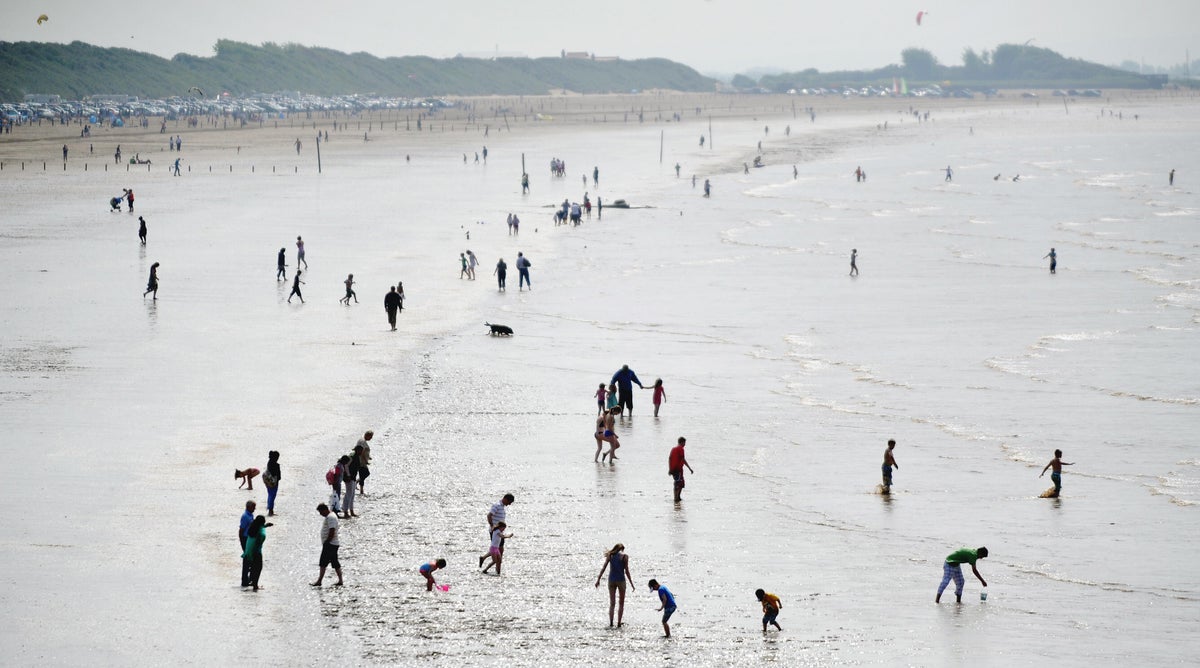
A record number of bathing spots across England have the worst quality of water new figures show, with swimmers urged to stay away for the sake of their health.
As hardy bathers brace for festive dips in the sea on Christmas Day and New Year’s Day, questions continue over the state of Britain’s waters.
The polluted spots include seaside resorts such as Weston-super-Mare in Somerset and Scarborough in North Yorkshire.
The Environment Agency’s sampling of coastal waters between May and September showed that out of 423 areas, 405 met the lowest minimum standard for cleanliness.
However, 18 failed and were classed as having a “poor” quality of bathing water. That figure is an increase on the 12 last year, and is the highest number recorded since 2015.
Testing is based on levels of E. coli and intestinal enterococci with samples taken over a four-year period. The grading is broken into four categories; excellent, good, sufficient and poor.
Swimmers are urged not to go in the bathing water if classed poor and signs must be displayed to warn people.
One of the problems facing England’s coastal waters is the release of sewage from pipe systems during heavy rainfall, as well as a run-off from farming fields and road drainage.
Earlier this year, swimmers were urged to not swim in the water off Blackpool after company United Utilities warned sewage and rainwater had been released from its water treatment plant in Fleetwood. According to the new data, the quality of bathing water at Blackpool North was poor, having been rated “good” just four years ago.
In Weston-super-Mare, three beaches along the town’s coast have the lowest rating for bathing water quality; the town’s main beach, Uphill and Sand Bay. The previous year, just the town’s beach had the unwanted rating.
Factors include sewage, runoff from agricultural land and seagulls, with tests indicating the birds’ droppings to be “a significant source of poor bathing water quality”, according to the Environment Agency.
Also in the south west, Dunster Beach in Somerset and Porthluney in Cornwall are deemed unsafe for swimmers. Elsewhere in the country, Bognor Regis in West Sussex, St Mary’s Bay in Kent and Scarborough South Bay in North Yorkshire are among the places where the quality of bathing water is poor.
Scarborough’s South Bay might be popular in the warm weather, as this picture shows in 2020, but its waters aren’t clean enough to swim in— (PA)
Porthluney Beach, also known as Carhays Beach, is a no-go area for swimmers after its water quality was rated poor. In 2022, it was rated sufficient.— (http://www.caerhays.co.uk/)
Tim Farron, Lib Dem’s environment spokesperson, described the situation as a national scandal and said the government needed to get tough on companies that cause pollution.
Responding to the latest figures, Mr Farron said: “It is insulting to see ministers pat themselves on the back after a shocking rise in swimming spots rated as poor water quality. Sewage is gushing into lakes and seaside spots yet conservative ministers think the problem is solved. This national scandal needs to end now.”
Shadow environment secretary Steve Reed also blamed the government: “It is disgusting that families and children cannot enjoy these waters without the threat of getting sick. Despite this gross negligence, consumers are now expected to pay higher water bills, whilst ehief executives are pocketing millions in bonuses.”
Water minister Robbie Moore said a government scheme called Plan For Water, aimed at toughening enforcement and driving investment in the industry, will continue to improve the country’s bathing waters.
Swimmers around the Cornish coast joined together at Gyllyngvase Beach to protest against the number of sewage discharges. Despite the protest taking place at the beach, the quality of bathing water off it is judged to be excellent.— (Getty Images)
Protesters emerged from the sea at Brighton West Pier as Surfers Against Sewage held a UK-wide paddle-out protest against pollution earlier this year— (PA)
He added: “Our bathing waters have improved significantly in recent years, and we are fully committed to seeing the quality of our coastal waters, rivers and lakes rise further for the benefit of the environment and everyone who uses them.”
Water UK, which represents the water company industry, said: “Thanks to water company investment the number of English bathing waters with a good or excellent rating has more than trebled since the 1990s.
“Although bathing water standards remain high, we share the Environment Agency’s aspiration that the quality of bathing water should improve year on year.”
Environment Agency chairman Alan Lovell said: “Many people enjoy time in or on lakes, rivers and coastal waters, and we know the value they bring in terms of social, health and wellbeing benefits. The slight fall in standards this year show we must go further to drive improvements and that this takes time and investment.”







